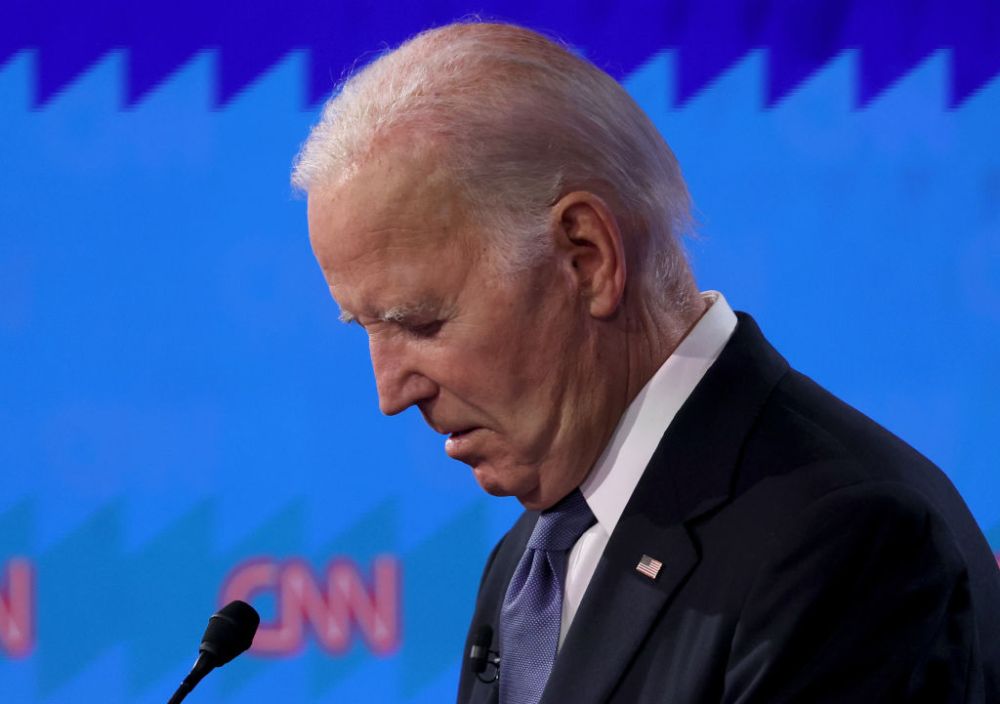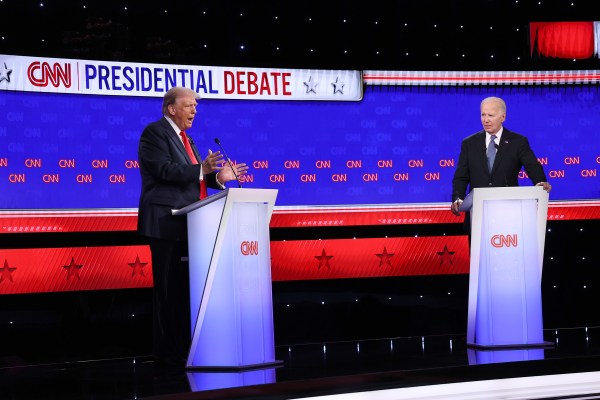Dear Reader (Don’t get your hopes up about this asteroid putting us out of our misery),
I’m pretty pissed.
Democrats, from Joe Biden on down, have been talking a great deal about “our democracy” and Donald Trump’s threat to it.
I agree with some, not all, of it (though I despise the phrase “our democracy”). Or to be more specific, I think it’s correct to be concerned about the damage Donald Trump might do to America’s democratic character and institutions. But I don’t necessarily agree with their versions of that argument or the scenarios they think might be most likely.
But who cares? My view of the threat isn’t relevant. Joe Biden, his team, his most ardent supporters are convinced—and quite self-righteous about it—that Trump poses an existential threat to democracy. But that conviction does not extend to doing everything they can to beat Donald Trump.
How do I know this? Because of what we saw last night. They knew Biden was like this. Maybe not all the time. I’m sure Biden has greater moments of lucidity and vigor. But they knew he’s like this often. And they proceeded with this debacle anyway.
Look, I get how life works with this kind of stuff. Personal loyalty, inertia, misplaced optimism, love of power and the sense of entitlement that comes with it, the confusion of what is with what ought to be, and old-fashioned denialism all played obvious roles here. I can lay out the explanations all day long. None of them amount to excuses.
Either you mean it when you say something is an existential threat or you don’t. If we were at war with China—or alien lizard people—and you saw that man last night, you wouldn’t say “let’s roll the dice” with him. Well, preventing a war with China is important, too. And, if Democrats are to be believed, saving democracy is important as well. And that requires explaining to Joe Biden—and Kamala Harris—that their egos and interests are not as important as what’s at stake. I’m not arguing for coups, or any other destroy-the-village-to-save-it measures. I’m asking for the requisite patriotism, republican stewardship, and seriousness the times require.
I have a fairly limitless supply of anger and contempt for the Republicans who have happily paved the way for Donald Trump. But the one thing you can’t really say about the vast majority of them is that they think Trump is an existential threat to democracy. Some may think—cynically and unforgivably—that he’s merely a possible threat to democracy. Some may think that he’ll bruise the peach of democracy, but it will still be edible after he’s gone. Some may believe there’s only a 5 percent chance he’ll behave like a dictator, and they’re willing to roll the dice on that, if doing otherwise means losing a primary or a TV gig. But most think all of this democracy stuff is overblown or partisan fakery.
The Democrats don’t. So, while we can blame Republicans for making Donald Trump a problem, that doesn’t let Democrats off the hook for failing to take the problem—as they see it!—seriously.
Yesterday (before the debate), my American Enterprise Institute colleague Ruy Teixeira—who has been the Democratic Party’s equivalent of the dude screaming, “To serve man! It’s a cookbook!” for a while—had an excellent piece titled “No, Democracy is *Not* on the Ballot.” After running through how the “Vote Biden to Save Democracy” messaging has failed utterly, according to a slew of polls, he writes:
It's hard to avoid the conclusion that Biden and his campaign are unduly influenced by what they believe should be true rather than what is true. They see Trump as an unspeakably evil man who is an existential threat to democracy and can’t imagine why that view wouldn’t be everybody’s and drive their vote inexorably toward Biden. But it isn’t and the sooner they realize that, the better their chances of actually beating the Bad Orange Man.
The Biden campaign has been like the ugly American who thinks foreigners will understand English if he just speaks it louder. Again, I’m open to that argument. But the voters Biden needs to win just aren’t. So if they actually believed what they were saying, they would run a campaign—and a candidate—who is up to the job and can win.
When the reality of Joe Biden’s unfitness is pointed out to them, the response has been, until last night, to deny it and to attack the people who say what Biden’s defenders already know. They get caught up in a tautology of their own making. Biden has to run because Trump must be defeated. Trump has to be defeated, so Biden has to run. It’s a bit like saying we have to put out the fire, but all we have is gasoline to douse it. Point out that gas doesn’t put out fires and you get called pro-fire.
Readers know—and are probably tired of hearing it from me—that I think the parties are too weak. So I get that the Democratic Party lacks the mechanisms, never mind the will, to do what is in its own best interests and the country’s. The Republican Party has the same problems. But you would think that if they actually believed this stuff, they’d work the problem rather than just glide along on autopilot, hawking dog food the dogs won’t eat.
Now, I think part of the problem, as I’ve written countless times now, is that progressives live in a bubble. Because they don’t know anyone who disagrees with their arguments—at least not anyone they don’t think is a deplorable Neanderthal—the voters must be like them too. The problem with this is there is just a mountain of data—from polls, election returns, etc.—responsible party leaders and campaign professionals have plenty of access to, that says otherwise. But if we just shout “democracy” louder that will change.
Trumpists have lived in a similar bubble, but that doesn’t mean anything right now because they’re winning.
I’ve spent a lot of time writing in eggheady terms about the nature of democracy and autocracy, the problems of “post-liberalism” on the left and the right. I like that stuff. More importantly, I think our problems are serious enough to write seriously about such things. The response from many readers has been disappointment with me that I don’t bring the funny and irreverent stuff anymore. What happened to “Fun Jonah?” “Why so serious?” And all that.
I have explanations for all that, starting with—again—the seriousness of the problems we face.
But maybe I was wrong. Maybe mockery, juvenile jocularity, and unserious language is best suited for these unserious times?
To that end, let’s talk about Benjamin Franklin. Serious Jonah might invoke Franklin’s famous response to Elizabeth Willing Powel's question at the conclusion of the Constitutional Convention: “Well, Doctor, what have we got, a republic or a monarchy?"
“A republic, if you can keep it.”
Franklin’s hedge was historically literate. Republics had a miserable record of failure going back to Ancient Rome, Serious Jonah might note and then explore why, say, the Republic of Venice collapsed.
But maybe we should instead talk about Ben Franklin’s less well-known epigram, “Fart Proudly.” Also known as his “A Letter to a Royal Academy about farting,” Franklin made a Swiftian case for the Royal Academy of Brussels to study how changes in diet could improve the odor of flatulence. A famously practical man, he was mocking the pretentiousness of scholars and experts.
So, as Mel Brooks probably said to his team when writing Blazing Saddles, let’s stay on farts. When Trump’s hand-picked candidates got shellacked in the midterms—in 2018 and 2022—I would joke that the right’s bubble problem was the result of too many conservative pundits and Republican politicians getting high on Fox News greenroom farts. There’s a similar phenomenon at MSNBC, where all day long they have panels of people in violent agreement about what Americans ought to care about, not realizing how few people share, or care about, their opinions.
So much of our political discourse these days amounts to a kind of farting from people who’ve gone nose-blind to it. The MAGA crowd talks endlessly about the threat of “woke-communism,” “critical race theory,” and other scary-sounding intellectual terms and the need to pursue “nationalism” to beat back the Marxist menace. The hard progressive left passes similar wind about “white supremacy,” “Christian nationalism,” and “authoritarianism.”
Now I think all of these things can be very serious things requiring very serious responses. But most of the people cutting this cheese have no serious grasp of any of it. All they know is that their enemies are serious and that justifies mimicking their tactics in the other direction. They steal elections, so we need to steal the election to stop them from stealing the election. They “weaponize” the justice system so we should weaponize it to stop them—and punish them. They lie, so we should lie. They overlook the unfitness and dangers of their candidates, so we have to do likewise. They pretend to be outraged so we should pretend to be outraged, too. Everyone is shrieking that if you smelt it, you dealt it. It’s like an artillery war of flatuosity.
This pungent discourse creates a malodorous fog that repels most normal people. The din of the thunderous trouser trumpets leads people to tune out the windy debate. The air becomes so saturated with this rhetorical methane, many people lose sight of the fact that some people will actually believe this gaseous ejecta is real. Working on such assumptions can become a self-fulfilling prophecy and one spark can ignite it.
The problem with farting for a living is that eventually you will force the issue to the point where you issue something more than hot air. Live by the fart, die by the leaky balloon knot. That is what is happening to our politics. Rather than do right, the right way, our leaders—and their followers—just keep saying “pull my finger” until they collectively sh-t the bed of “our democracy.”
I apologize that this is not in fact all that funny. But then again, none of this is actually very funny.
Canine update: I’ve been on the road all week so I don’t have a lot of first-hand quadruped reporting to offer. The heat was apparently pretty miserable and so the dogs were happy to take things easy. Pippa, of course, was true to her spanielness (as was Clover) and defied authorities to get wet whenever possible. Zoë was happy to stay on the sidelines and provide security. When home, Pippa continued her vigilance on the important task of keeping the walls up. TFJ brought her own distinctive style to treat time, which elicited some resistance. Chester, I’m sure, continued to get his treats while I was gone. And Gracie continued to sun her royal belly. Oh, speaking of Chester, readers are often very concerned about Chester’s safety during fox season in my neighborhood. Fox season is the wrong term; we have foxes year-round. But every spring, they have babies and that means one fox (I assume the dad, but I don’t want to traffic in gender stereotypes) sets up watch to make sure no one gets near their nest and to warn of threats in the area. That’s the crazy sound they make. Chester and the foxes have had many encounters, and Chester comes out fine. But it’s very loud. One of our neighbors sent us some security cam video—and audio!—for those interested.







Please note that we at The Dispatch hold ourselves, our work, and our commenters to a higher standard than other places on the internet. We welcome comments that foster genuine debate or discussion—including comments critical of us or our work—but responses that include ad hominem attacks on fellow Dispatch members or are intended to stoke fear and anger may be moderated.
With your membership, you only have the ability to comment on The Morning Dispatch articles. Consider upgrading to join the conversation everywhere.